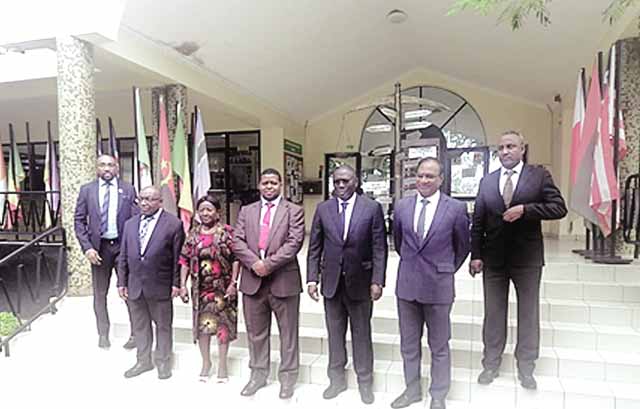By Sibusiso Ngubane | 2025-01-24
In the close-knit community of Lobamba, outside Eswatini's capital, lived a man who was deeply rooted in tradition.
His family had adamantly opposed circumcision for many generations.
This cultural position believed circumcision was needless and even dangerous.
Manqoba Dlamini in his mid-30s initially frowned at the idea, “We are healthy without circumcision – it's not a priority for us,” he held in his mind. “Without it, our forefathers led fulfilling lives.
Why should we make the adjustment now”, he would ask often.
Things began to change after attending a community meeting.
The catalyst for change
Jhpiego in collaboration with Ministry of Health, began to promote Voluntary Medical Male Circumcision (VMMC) in the area, sparking a change he never expected. Gradually, Manqoba’s interest grew, and he regularly attended the community sessions.
These sessions were carefully designed to be both informative and supportive, allowing attendees to raise concerns and ask questions. Curious but cautious, he took advantage of the opportunity to seek clarity on circumcision, questioning everything he could.
As his questions were answered in a respectful and detailed manner, his perspective started to shift. The information he received helped him understand the health benefits of VMMC, and eventually, he made a life-changing decision: he chose to undergo the procedure himself, facilitated by the ministry of health and implementing partner in his region, Georgetown University.
A personal transformation and advocacy
The results were transformative. Not only did he personally experience the health benefits of circumcision, but he also became an advocate for VMMC.
“I never thought I would get circumcised, but after learning about the benefits, I decided to go through with it,” Mr. Dlamini reflected. Inspired by his decision, two of his nephews followed his lead, as did three of his closest friends. “I don’t regret a single day since I got circumcised, and I encourage all Emaswati men to consider it,” he added.
Thanks to his advocacy, more men in his community, especially those who were once opposed to the idea, have shown interest in VMMC. His journey from sceptic to advocate is a powerful example of how community engagement can change lives and improve public health.
“Reaching men in hard-to-reach communities with VMMC services requires a dedicated, consistent and adaptive approach, but the impact on health outcomes is substantial”, explained Londiwe Dlamini, Jhpiego’s Technical Advisor.
As of the latest data, Eswatini has one of the highest HIV prevalence rates globally, with approximately 24.8 per cent of adults (15+) living with HIV.
In support of the UNAIDS 95-95-95 targets, Eswatini has achieved 94 per cent of people living with HIV who know their status, 97 per cent of those diagnosed are on access treatment, and 96 per cent of those on treatment have achieved viral suppression. Jhpiego Eswatini has focused on VMMC as a key intervention for HIV prevention.
Through innovative community engagement strategies, including targeted social media campaigns, localised outreach programs, and client-focused demand creation,
Jhpiego assisted has successfully enhanced VMMC uptake, contributing to HIV prevention and improved health outcomes in the communities served.
To date, over 500 men in this community have been reached with VMMC messaging, and more than 20 men have chosen to be circumcised.
This effort is part of the strengthening of the Kingdom of Eswatini's Voluntary Medical Male Circumcision project, funded by U.S. Centers for Disease Control and Prevention (CDC) under the U.S. President’s Emergency Plan for AIDS Relief (PEPFAR), that covers all four regions of the country through 12 VMMC sites.
Key implementing partners, including Georgetown University, University Research Co. LLC(URC), The Luke Commission and Aspire (a project under EGPAF), play an essential role in supporting this initiative by providing voluntary medical male circumcision (VMMC) services to men who express interest in the procedure.
Voluntary Medical Male Circumcision (VMMC) in Eswatini is a strategic health initiative aimed at reducing the prevalence of HIV and AIDS and other sexually transmitted infections (STIs). The significance of this programme stems from studies indicating that circumcision can lower the risk of men acquiring HIV by approximately 60 per cent.
The VMMC programme in Eswatini serves as a crucial component of the nation's efforts to combat HIV and AIDS. By integrating medical services with community outreach and education, the program seeks to lower HIV transmission rates while respecting cultural contexts.
As a part of wider public health strategies, the VMMC initiative holds significant promise in reducing the burden of HIV in Eswatini.
According to data from the Ministry of Health from 2009 to 2024 a total of 179 467 translating to 48 per cent of eligible men are circumcised in Eswatini.
Voluntary medical male circumcision remains a significant tool in the country’s efforts to end AIDS as a public health threat by 2030.
share story
Post Your Comments Below
Prime Minister Russell Dlamini has applauded the police service for busting the extensive and hig...

Auditor General, Timothy Matsebula has been elected Chairperson of the African Union Board of Ext...
SOME university students are appealing for public assistance in getting out of gambling and deali...

MBALENHLE Manana, the founder and CEO of Top Models Eswatini, has been appointed as the Chief Jud...
All material © Swazi Observer. Material may not be published or reproduced in any form without prior written permission.
Design by Real Image Internet